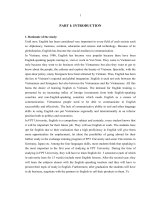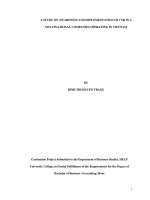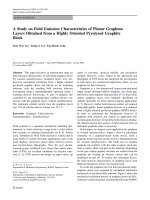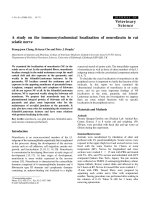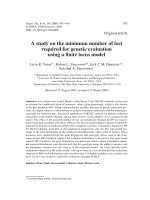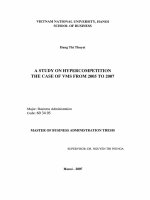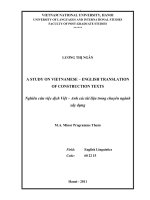A study on indigenous fermented foods of Manipur, India
Bạn đang xem bản rút gọn của tài liệu. Xem và tải ngay bản đầy đủ của tài liệu tại đây (165.05 KB, 4 trang )
Int.J.Curr.Microbiol.App.Sci (2019) 8(5): 754-757
International Journal of Current Microbiology and Applied Sciences
ISSN: 2319-7706 Volume 8 Number 05 (2019)
Journal homepage:
Original Research Article
/>
A Study on Indigenous Fermented Foods of Manipur, India
Huidrom Sobharani Devi, Daisy Sharma* and Sushree Sangita Senapati
Assam Downtown University, Assam, India
*Corresponding author
ABSTRACT
Keywords
Fermented foods,
Ngar, Soibum,
microbial and
storage studies
Article Info
Accepted:
10 April 2019
Available Online:
10 May 2019
The present study was planned to assess the nutritional status and consumption pattern of
fermented foods among local people of Manipur. From the survey the most commonly
consumed foods fermented fish (Ngari) and fermented bamboo shoot (Soibum) were screen out
and further organoleptic microbial and storage studies were carried out in the selected products.
From the present study, it was revealed that 53 % of the respondents were having poor
knowledge, 34% were in average knowledge and 13 % of the respondents were in good
knowledge. Likewise attitude of the respondents based on preserving were in 21 % in poor
state, 50 % were in average and 29 % of the respondents were in good state. After completion
of survey based on the result the two fermented products were selected for further study. Across
over storage products were evaluated for thrice the sensory qualities by a semi- trained panel
consisting of 15 members The quality parameters such as the taste, colour, appearance, texture,
flour, crispiness and its overall acceptability of the samples by using 9 point hedonic testing
scale to find out the acceptability of the products. Out of the four formulations the S4 shown
highest scores for all sensory attributes in terms of colour (9), appearance (9), taste (9), texture
(9), flavor (9), consistency (9), and overall acceptability (9). Isolation and morphological
characterization of the microorganism present in across storage of fermented food products
were also performed it shows that among 5 samples NA of fermented fish, NA10 -4 and NA 10-5,
were found to be gram negative. Likewise among 5 samples NA of fermented bamboo shoot,
NA10-3, NA 10-4 and NA 10-5 were found to be gram negative. Again from 5 samples of PDA of
fermented fish, PDA 10-1, PDA10-2, PDA10-3, were found as yeast and fungi and remaining
samples there was no growth. Similarly among 5 samples PDA of fermented bamboo shoot,
PDA10-1, PDA10-2 was found to be yeast remaining were no growths. It can be concluded from
the study that the people of Manipur prefer fermented food in their daily diet, though
knowledge and attitude about preservation and storage of fermented food was very poor. Hence
a study was done on storage stability of selected fermented products and found that it can be
stored till 3 months without affecting the taste as well as no microbial load.
enhancing the amount of vitamins and
protein solubility (Sohliya et al., 2009).
Indigenous fermented foods have been
prepared and consumed for thousands of
years, and are strongly linked to culture,
traditions and reveal the intellectual richness
Introduction
Fermentation is one of the oldest forms of
food technology in the Indian Subcontinent
(Deka, 2012) and is reported to enhance the
nutritional quality of any product by
754
Int.J.Curr.Microbiol.App.Sci (2019) 8(5): 754-757
of indigenous people of the country in terms
of their ability to prepare microbial products
for varied purposes in addition to food and
beverages (Sekar and Mariappan, 2007).
Ngari, a fermented fish product of Manipuri
is the valuable endowment to the people of
Manipur since from many decades and gave
immense values. It is produced by age-old
practice of yearlong natural fermentation
and used as an appetizer and flavor enhancer
in different food preparations due to its
excellent organoleptic properties (Jeyaram et
al., 2009). Phoubu, a sun dried, non-salted
dry form of a fish species Puntius sophore is
used for the preparation of ngari dish
(Jeyaram et al, 2009). During the
fermentation of Ngari, the fish (Puntius
sophore) is rubbed with salt, dried in the sun
for 3–4 days, pressed tightly in an earthen
pot, sealed airtight and then stored at room
temperature for 4–6 months (Thapa 2002).
Manipur and further organoleptic microbial
and storage studies were carried out in
fermented fish (Ngari) and fermented
bamboo shoot (Soibum).
Materials and Methods
For this study, the respondents were selected
100 respondents purposively from the local
people of Manipur under the age of 18-76.
However these products are mainly prepared
in villages, apart from this Kakching,
Sangaiprou, Utlou, Sekmai, Bisnupur, were
selected to accomplish the goal. The study
was done by interview technique based
using standard questionnaires. Data was
collected on socio-demographic information,
knowledge and attitude of respondents. The
product immediately after preparation was
brought to the laboratory of Food, Nutrition
and Dietetics Department, College of Assam
down town University to study the microbial
analysis, storage stability and sensory
evaluation of selected fermented foods of
Manipur. The organoleptic test was carried
out at regular interval of time.
In Manipur, a state located in the north
eastern part of India, bamboo shoot is
consumed as fresh or fermented form,
locally called Soibum (Jeyaram et al., 2009).
The two traditional preparations, namely the
Kwatha and Andro types, have high market
demand and are produced by the ethnic
communities of the Chandel and ImphalEast districts of Manipur (Jeyaram et al.,
2009). Bamboo is well known to the people
of Manipur because of its multipurpose
economic uses and because it is associated
with legends (P. K. Singh et al., 1996).
Soibum is the traditional fermented bamboo
shoot product of Manipur which has a
typical sour-acidic flavour and taste. It is
mostly used for cooking with mustard oil,
potatoes and spices for making curry. Since
the local people of Manipur extensively use
fermented foods in their daily diet, the
present study A study on indigenous
fermented food products of Manipur has
been to assess the nutritional status and
consumption pattern of local people of
Results and Discussion
The present study aimed to assess the socio
demographic information among the local
people of Manipur. A total of 100
respondents were taken under the age group
of 18-76 years. From the present study it
was revealed that out of 100 respondents 47
% were male and 53% were female. Out of
the total respondents enrolled in the study
6% of the people were unmarried, 94% were
married.46% were 8-10 pass, 35 % were 1112 pass, 19 % were graduation. The family
size of the respondents were mostly nuclear
consisting of people that is 41% (4-5
members), 48% belonged to(6-7 members),
11 % consist of( 8-10 members). About the
purpose of food preservation, 22 % of the
respondents were conceiving preserve food
755
Int.J.Curr.Microbiol.App.Sci (2019) 8(5): 754-757
for flavor, 42% for shelf life and 26% for
enrich nutrients. During fermentation of fish
100% of the respondents were using earthen
pot and correspondingly 100% of the
respondents were using bamboo plank
chamber.
Regarding
knowledge
of
fermentation female has more knowledge as
compare to male that is 66% of the
respondents for female and 34 % of the
respondents for male. 56% of the
respondents were visualize that these
products can be taken freely, 12 % of the
respondents were not having any idea about
these products. While consuming these
products 100% of the respondents were not
obtaining any faith or believe. And 11% of
the respondents were using new practical
method for fermentation of these products
but as long as 89 % of the respondents were
not. For preserving these products 6 % of
the respondents were believe that the
producer/seller of fermented products were
using any chemical while manufacturing,
57% of the respondents were not and 37% of
the respondents were not getting any
suggestion of fermented fish. About
preserving these fermented fish, 78% of the
respondents were not affirm that there was a
specific season, 22 % were not having any
clue. Likewise for fermented bamboo
shoots, 66% of the respondents were not
affirm that there is a specific season, 34 %
were not having any concept. Although 37
% of the respondents were believed that
fermented fish and fermented bamboo
shoots are providing health benefits while
consuming,18 % of the respondents were
not and 45 % of the respondents were not
having any idea. From the survey it was
found that 23 % of the respondents were
getting knowledge from traditional heritage
and 77 % of the respondents from others.
Lastly from the present study of KA
(knowledge and attitude) score, it provides
questionnaire based on knowledge and
attitude and perform after study which was
done before the research in relation with the
topic of traditional knowledge of fermented
foods and revealed that 53 % of the
respondents were having poor knowledge,
34% of the respondents were in average
knowledge and 13 % of the respondents
were in good knowledge. Likewise attitude
of the respondents based on preserving were
in 21 % in poor state, 50 % of the
respondents were in average and 29 % of the
respondents were in good state. After
completion of survey based on the result the
two fermented products were selected for
further study. Across over storage products
were evaluated for thrice the sensory
qualities by a semi- trained panel consisting
of 15 members The quality parameters such
as the taste, colour, appearance, texture,
flour, crispiness and its overall acceptability
of the samples by using 9 point hedonic
testing scale. to find out the acceptability of
the products.
Out of the four formulation the S4 shown
highest scores for all sensory attributes in
terms of colour (9), appearance (9), taste(9),
texture(9), flavor (9), consistency(9), and
overall acceptability (9). The fermented food
products were acceptable even across 3
month of storage. The slight increase in
overall acceptability of fermented products
in sensory scores over storage was seen
from 1 month to 3 months. The study
showed that the fermented products can be
stored till 3 months with changes in sensory
attributes terms of colour, appearance, taste,
texture,
flavour,
crispiness,
overall
acceptability. Isolation and morphological
characterization of the microorganism
present in across storage of fermented food
products were also performed it shows that
among 5 samples NA of fermented fish,
NA10-4 and NA 10-5, were found to be gram
negative. Likewise among 5 samples NA of
fermented bamboo shoot, NA10-3, NA 10-4
and NA 10-5 were found to be gram
756
Int.J.Curr.Microbiol.App.Sci (2019) 8(5): 754-757
Jeyaram, K., Singh, T. H., Romi, W., Devi, A.
R., Singh, W. M., Dayanidhi, H., Singh,
N. R. and Tamang, J. P., 2009.
Traditional fermented foods of Manipur.
Indian Journal
Ranendra K. Majumdar,Deepayan Roy
,Sandeep Bejjanki and Narayan Bhaskar
(2016). An overview of some ethnic
fermented fish products of the Eastern
Himalayan region of India. journal
homepage:
.
J.Ethn
Foods 276-283.
Rose Koffi-Nevry and Marina Koussemon.
2012. Microbiological Composition,
Processing
and
Consumer’s
Characteristics of Adjuevan, a Traditional
Ivorian Fermented Fish. Tropicultura, 30,
1, 9-14 .
Sekar, S and S Mariappan. 2007. Usage of
traditional fermented products by Indian
rural folks and IPR, Indian J. Traditional
Knowledge, 6, 1, pp. 111-120.
Singh, P. K.
and H. B. Singh. 1996.
Superstition in botanical folklore with
reference to Meitei culture,J. Econ.
Taxon. Bot., Add. Series 12, 367–372 .
Sohliya, S R Joshi, R K Bhagobaty and R
Kumar. 2009. Tungrymbai- A traditional
fermented soybean food of the ethnic
tribes of Meghalaya, Indian J. Traditional
Knowledge, 8, 4, pp. 559-561.
Stone H and Sidel J.L . 1993. Sensory
evaluations
practices,
California
:Academic press.
Thapa, N. 2002. Studies on microbial diversity
associated with some fish products of the
Eastern Himalayas, PhD thesis, North
Bengal University,India.
negative. Again from 5 samples of PDA of
fermented fish, PDA 10-1, PDA10-2, PDA103,
were found as yeast and fungi and
remaining samples there was no growth.
Similarly among 5 samples PDA of
fermented bamboo shoot, PDA10-1, PDA102
were found to be yeast remaining were no
growths.
It can be concluded from the study that the
people of Manipur prefer fermented food in
their daily diet, though knowledge and
attitude about preservation and storage of
fermented food was very poor. Hence a
study was done on storage stability of
selected fermented products and found that
it can be stored till 3 months without
affecting the taste as well as no microbial
load. Extensive study is require to work with
indigenous people to explore better
knowledge of health benefit about fermented
food products and further nutritional
assessment will be more useful.
References
Chaiyavat Chaiyasut, Bhagavathi Sundaram
Sivamaruthi, Netnapa Makhamrueang,
Sartjin Peerajan, Periyanaina Kesika.
2017. A survey of consumer’ opinion
about consumption and health benefits of
fermented plant beverages in Thailand.
Food Science and Technology.
Deka, S C., 2012. Mini Review on Fermented
foods and beverages of the North-East
India, Int. Food Res. J.,19, 2, pp. 377-392
Hucker, G. L., and H. J. Conn. 1923. Methods
of gram staining .Technical bulletin no.
93. New York Agricultural Experimental
Station, Geneva, N.Y.
How to cite this article:
Huidrom Sobharani Devi, Daisy Sharma and Sushree Sangita Senapati. 2019. A Study on
Indigenous Fermented Foods of Manipur, India. Int.J.Curr.Microbiol.App.Sci. 8(05): 754-757.
doi: />
757


